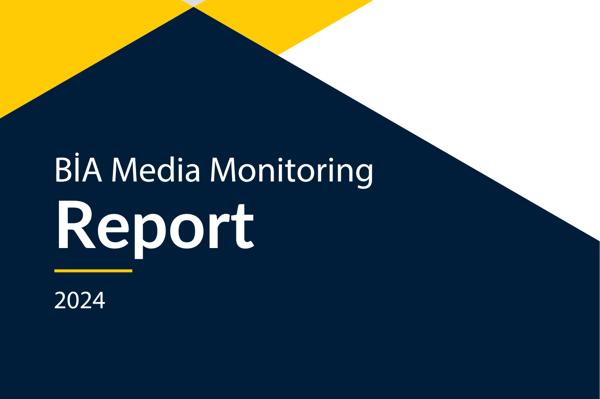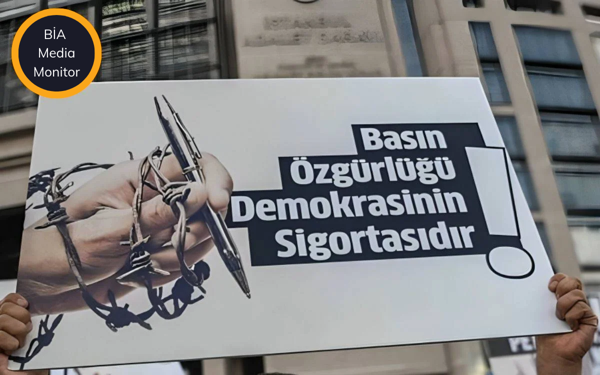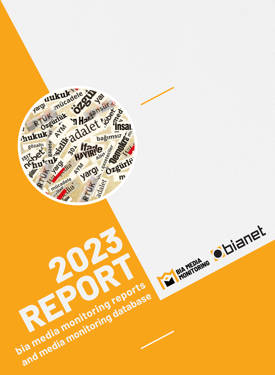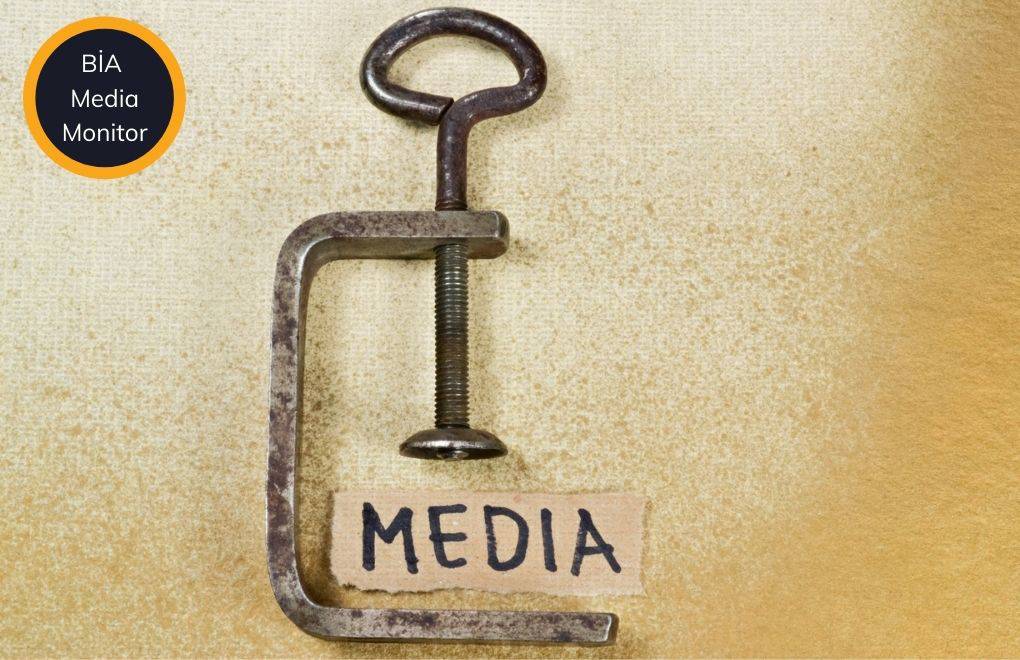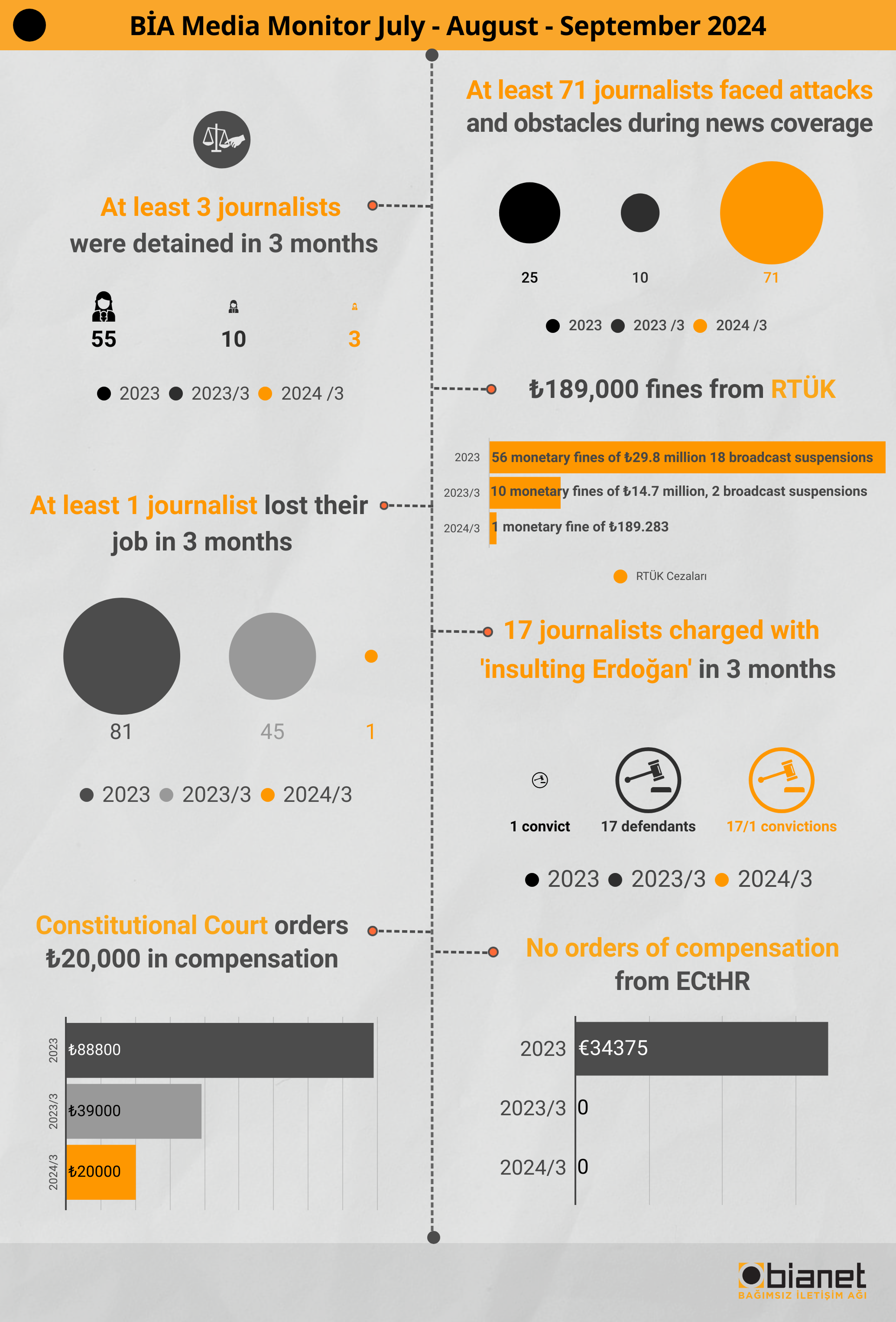
Although physical violence and arrests of journalists in Turkey have recently decreased, concerning practices such as erasing online news that criticizes those in power, and especially the threats against journalists by the ruling coalition partner Nationalist Movement Party (MHP) and its political affiliates have created a troubling environment that legitimizes arbitrariness and impunity.
The Penal Judgeships of Peace and the Access Providers Union, upon requests from circles close to the government, religious groups, MHP affiliates, bureaucrats, and entrepreneurs, imposed access bans on at least 87 news reports and hundreds of journalistic social media posts between July and September, citing “personal rights.” It has now become nearly impossible to report on topics such as corruption, favoritism, irregularities, religious orders, and exploitation of faith in Turkey.
The BİA Media Monitoring Report covering July, August, and September shows that at least 164 journalists were tried in criminal cases, with five facing lawsuits for damages. Additionally, 68 journalists were subjected to threats from MHP and its affiliated political groups, and 77 journalists, with Hayko Bağdat being the latest addition, were convicted of “insulting the president.” Furthermore, concerns are growing over the increasing restrictions on journalists using YouTube, access bans based on “personal rights,” and the announcements by authorities of new or revised regulations regarding “influence agents.”
Due to the sharp decline in media freedom and rule of law, Reporters Without Borders (RSF) ranked Turkey 158th out of 180 countries in the World Press Freedom Index. RSF called on President Recep Tayyip Erdoğan, as he marks his 10th year in office, to “implement comprehensive reforms to protect independent journalists and ultimately guarantee the right to access information in the country.”
Attacks replaced by widespread MHP threats
The MHP, the ruling coalition partner, and affiliated political groups such as the Grey Wolves (Ülkü Ocakları), are benefiting from a system that disregards the law, threatening investigative journalists who persistently report on sensitive topics like the Sinan Ateş assassination in Ankara, as well as media outlets like Halk TV. This occurs in an environment where judicial authorities fail to take action.
Of the 71 journalists who were threatened through statements or so-called "petitions" in the July-August-September period, 68 were targeted by the MHP and its affiliated groups. Similarly, in the petition that the MHP submitted to the court in the Ateş assassination case, in which the party claimed to be a "victim of the crime," 63 out of 154 named individuals were journalists. During the trial, defendant and hitman Eray Özyağcı also threatened journalists following the case by making a gun gesture.
Fourteen acquittals, 11 convictions in three months
Between July and September, Kurdish media representatives accused of “membership in a terrorist organization,” including Diren Yurtsever, Deniz Nazlım, Berivan Altan, Selman Güzelyüz, Hakan Yalçın, Emrullah Acar, Zemo Ağgöz, and Öznur Değer, a reporter for the JinNews site, were sentenced to a total of 50 years in prison. Exiled journalist Hayko Bağdat was sentenced to a suspended prison term of 1 year, 2 months, and 17 days for “insulting the president.” Additionally, the administrators of the Yüksekova Haber site, Erkan Çapraz and Ömer Oğuz, were each fined 16,660 liras for “terrorist propaganda” after publishing a panel speech by former HDP MP Leyla Güven on their website and YouTube channel.
During this period, 14 journalists, including Elif Akgül and Haluk Kalafat, were acquitted in cases where they were accused of “illegally disseminating private conversations,” “obtaining and publishing personal data,” “terrorist propaganda,” “publicly spreading misleading information,” “violating the law on meetings and demonstrations,” and “membership in a terrorist organization.” The 20-month prison sentence of Bülent Mumay, Deutsche Welle (DW) Istanbul Office Coordinator and journalist, for “disseminating personal data,” was upheld by the appeals court, and the case will now be taken to the Constitutional Court.
Hayko Bağdat among 17 defendants sentenced for “insulting the president”
Between July and September, at least 17 journalists and cartoonists, including Barış Pehlivan, Ozan Alper Yurtoğlu, Deniz Yücel, İhsan Çaralan, İnan Kızılkaya, Ahmet Sever, Hayko Bağdat, Sedef Kabaş, Erk Acarer, Julien Serignac, Gerard Biard, Laurent Sourisseau, "Alice", Ramazan Yurttapan, Haydar Ergül, Furkan Karabay (twice), and Rüstem Batum, faced trials on charges of “insulting the president.” In one of these cases, exiled journalist Hayko Bağdat was sentenced to a suspended prison term of 1 year, 2 months, and 17 days. These cases, which collectively foresee a total of 84 years in prison, are based on Article 299 of the Turkish Penal Code.
Article 299 has served as a legal basis for the prosecution of over 250 journalists during Recep Tayyip Erdoğan’s 10-year presidency, resulting in the sentencing of at least 77 journalists, including Hayko Bağdat, to prison terms or fines, some of which were suspended.
The actors behind journalist convictions: Government and judiciary
During July, August, and September, at least 18 journalists faced one or more criminal trials following complaints made by government and judicial circles accusing them of “insult,” “insulting a public official,” or “slander.” While no conviction rulings were issued during this period, journalists Oktay Candemir, Hayko Bağdat, Barış Pehlivan, and Mustafa Büyüksipahi were acquitted.
Halkbank lawsuit against BirGün for 1 million, Kabaş fined for “Erdoğan” remarks
In the past three months, at least five journalists and two media outlets faced lawsuits seeking a total of 2,065,000 liras in damages. In one case, journalist Sedef Kabaş was ordered to pay 115,000 liras for comments about President Erdoğan on Tele1, in a lawsuit originally demanding 250,000 liras. In another case, Halkbank filed a 1 million TL defamation suit against the BirGün newspaper and its website birgun.net over journalist Timur Soykan’s report titled "Halkbank's 550 million loan to the mafia."
Censorship of 87 news reports and hundreds of journalistic posts
In response to applications from government circles, community groups, MHP affiliates, bureaucrats, and entrepreneurs, the Criminal Judgeships of Peace and the Access Providers Association imposed access bans on at least 87 news reports and hundreds of related social media posts between July and September, citing “personal rights.”
A broadcast ban was imposed on the news regarding the murder of 8-year-old Narin Güran in Diyarbakır, and although the ban was lifted, warnings about the "confidentiality of the investigation" followed. What remained missing was regular, transparent, and healthy updates to the media regarding the developments in the case.
RTÜK's censorship of Açık Radyo overturned in court
The public interventions by Radio and Television Supreme Council (RTÜK) Chair Ebubekir Şahin continue to add an undemocratic layer to the council’s politically charged decisions, which have sparked heavy criticism from independent civil society. Meanwhile, Şahin felt justified in re-sharing Milliyet columnist Zafer Şahin’s social media post in which he called journalist Fatih Altaylı a derogatory term, responding with a clapping emoji. Most recently, the administrative court overturned RTÜK’s 189,283 TL fine and five broadcast suspensions imposed on Açık Radyo for referring to the "Armenian Genocide."
There's some good news, too!
In the past three months, along with the 14 journalists who were acquitted, the 10th Administrative Court of Ankara rejected RTÜK’s appeal against the Administrative Court's decision to halt its sanctions on Açık Radyo, which had included heavy fines and broadcast suspensions. Özer Akdemir, the İzmir representative of Evrensel newspaper, also won his case in the Administrative Court regarding the unjustified cancellation of his press card. Additionally, an İstanbul court sentenced M.Y. to prison for threatening journalist İ.H.H. in a social media post, in which he wrote, "They cut off the head of a rooster that crows at the wrong time." Furthermore, journalist and TV presenter Şirin Payzın filed a lawsuit against Zafer Party leader Ümit Özdağ for targeting her on social media.
'Where is the journalism in this?'
The murder of 8-year-old Narin Güran in Diyarbakır garnered significant media attention. However, media outlets across the spectrum faced harsh criticism for their lack of adherence to ethical standards. Media ombudsman and journalist Faruk Bildirici expressed his frustration, saying, “You won't be certain of the facts, yet you will harvest ratings by speculating and trampling on pain with unverified rumors. Where’s the journalism in this?”
Sinan Aygül wins in Constitutional Court
During this period, the Constitutional Court ruled in favor of journalist Sinan Aygül, who had been convicted and imprisoned for calling AKP Bitlis MP Vahit Kiler a “cunning politician” in his article Jeo-Vurgun. The court ruled that the defamation sentence was a violation of freedom of expression and awarded Aygül 20,000 TL in compensation. Another appeal to the Constitutional Court is expected from journalist Bülent Mumay, who was sentenced to 20 months in prison for his report on a company that seized Istanbul Metropolitan Municipality's metro loan.
Gülbin Tosun parts ways with NOW TV
In the last three months, Gülbin Tosun, the anchor of NOW TV's Main News Bulletin, announced that she had parted ways with the channel after being forced to take a leave of absence following her criticism of Ankara Mayor Mansur Yavaş’s remarks about stray animals. (EÖ/VK)






